 |
 |
 |
| |
Loneliness Among Older People (44%) Living with HIV:
Why the ''Older Old'' are Less Lonely Than the ''Younger Old'' (53%)
|
| |
| |
--------------------------------------------
Advocates & local & federal officials MUST do more to address thus problem of aging & HIV, the suffering & consequences many older HIV+ over 65 is not getting the recognition & attention needed, often these older PLWH are suffering mental & physical disability, unable to function normally, unable often to maintain their home, unable to shop or pay bills & get evicted. Death rates & suicides are going to increase. We need research that reflects the needs of these PLWH in their daily lives & in the clinic. Jules Levin, NATAP
Loneliness among older adults living with HIV: a study and online community
Reported 2018 at IDWeek
In the full multivariate model, odds of loneliness were 45% lower in people 60 to 64 versus 50 to 59 (P = 0.015) and 66% lower in people 65 or older versus 50 to 59 (P < 0.001). Multivariate analysis identified 6 other independent predictors of loneliness: being single (adjusted odds ratio [aOR] 2.34, P = 0.001), living alone (aOR 2.12, P = 0.008), college education versus less (aOR 2.43, P < 0.001), depression (aOR 2.30, P = 0.019), recreational drug use (aOR 1.59, P = 0.045), and current smoking (aOR 1.85, P = 0.046).
The researchers noted that a previous study using the same loneliness scale found an 18.1% loneliness prevalence in a non-HIV group 52 years old or older [2], compared with the 48.3% prevalence in the ADHOC HIV group. In 836 HIV-positive Canadians 35 or older, a single-question test determined that 18% felt lonely "quite often" and 46% "sometimes" felt lonely [3]. As in the new US study, older Canadian study participants felt lonely less often than younger (35-to-45) participants.
The US investigators concluded that loneliness is highly prevalent in this HIV population. They noted that the inverse relationship between aging and loneliness "was mirrored by the observation that quality of life improved as age increased." One might also surmise that, as people age, those more active and socially engaged may be more likely to join an online community like ADHOC. From Jules: I do not necessarily believe this explanation, as many older HIV+ do not socialize, maybe in these groups studied socialization is better but certainly many older HIV+ do NOT socialize, many experience severe internalized stigma which I believe is worse than mere HIV stigma, and I believe those suffering the worst consequences if aging & HIV such as experiencing frailty, cognitive impairment, inability to function normally like not being able to shop or maintain their home or pay bills - these individuals I be live suffer severe internalized stigma and do not socialize well and are lonely, depressed, more likely to escape with drug use, and are at the greatest risk for suicide or death, and also at greater risk for non adherence to their HIV medications. Neither the AIDS Strategy nor the End AIDS Project incorporate addressing or even discussing the Aging & HIV problem. This issue needs more national discussion & recognition; better care in the clinic is needed with special attention & additional time devoted to the daily living needs, coping & medical care for these individuals, the RWCA needs to be changed to reflect this in the clinic, more support services are needed for this group, better interaction & more time is needed between the specialist like the cardiologist & the HIV doctor/clinician & the patient. Jules
Aging- HIV Clinic/NYC - "We are Unprepared to Care for Aging" - Those who are over 50 years of age must contend with HIV infection and aging simultaneously, and the current workforce is unprepared to care for this aging population" "In light of near-normal lifespans for PLHA, a recent Dutch study projected that by 2030, 73% of those infected with HIV will be at least 50 years of age and 39% will be 60 years or older.
ViiV ADHOC Aging/HIV Study Registry / Database - "Loneliness Among Older Adults HIV+”
--------------------------------------------
Reported by Jules Levin
IAS 2019 July 21-25 Mexico City
Peter Mazonson1 ,Jeffrey Berko1 , Theoren Loo1 , Andrew Zolopa2, Frank Spinelli2, Tammeka Evans2, Philip Grant3, Maile Karris4
1Mazonson & Santas, Inc., Larkspur, CA, USA (2) ViiV Healthcare, Raleigh, NC, USA (3) Stanford University, Stanford, CA, USA (4) University of California San Diego, San Diego, CA, USA
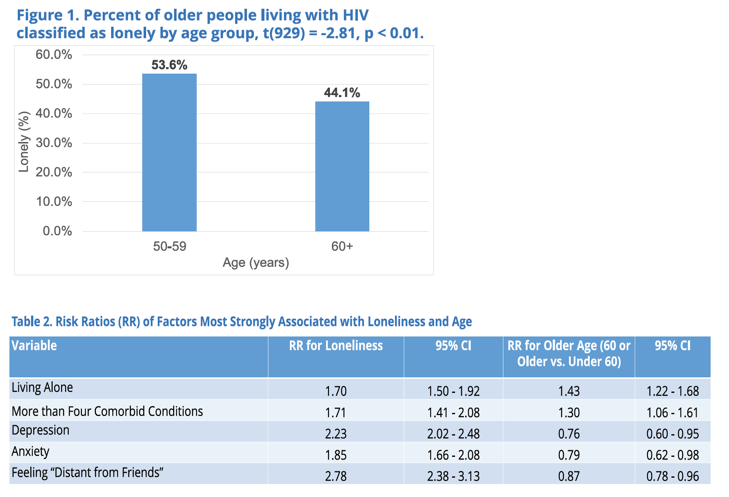
Reported by Jules Levin
IAS 2019 July 21-25 Mexico City
Peter Mazonson1 ,Jeffrey Berko1 , Theoren Loo1 , Andrew Zolopa2, Frank Spinelli2, Tammeka Evans2, Philip Grant3, Maile Karris4
(1) Mazon son & Santas, Inc., Larkspur, CA, USA (2) ViiV Healthcare, Raleigh, NC, USA (3) Stanford University, Stanford, CA, USA (4) University of California San Diego, San Diego, CA, USA
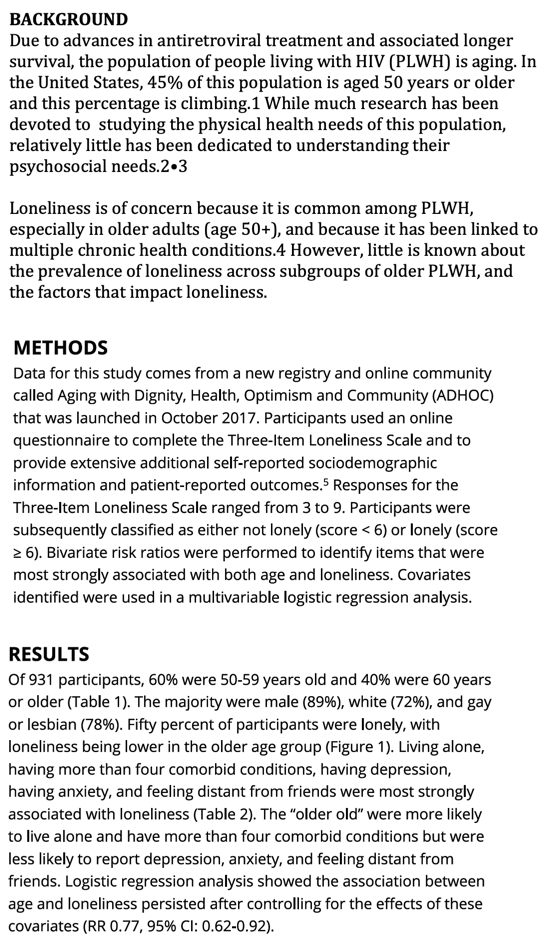
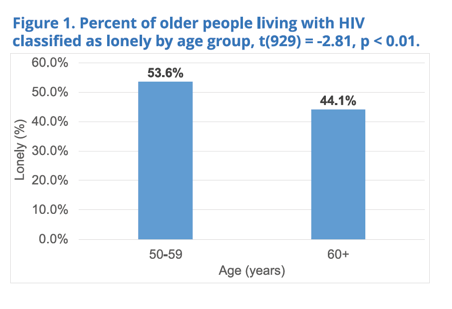
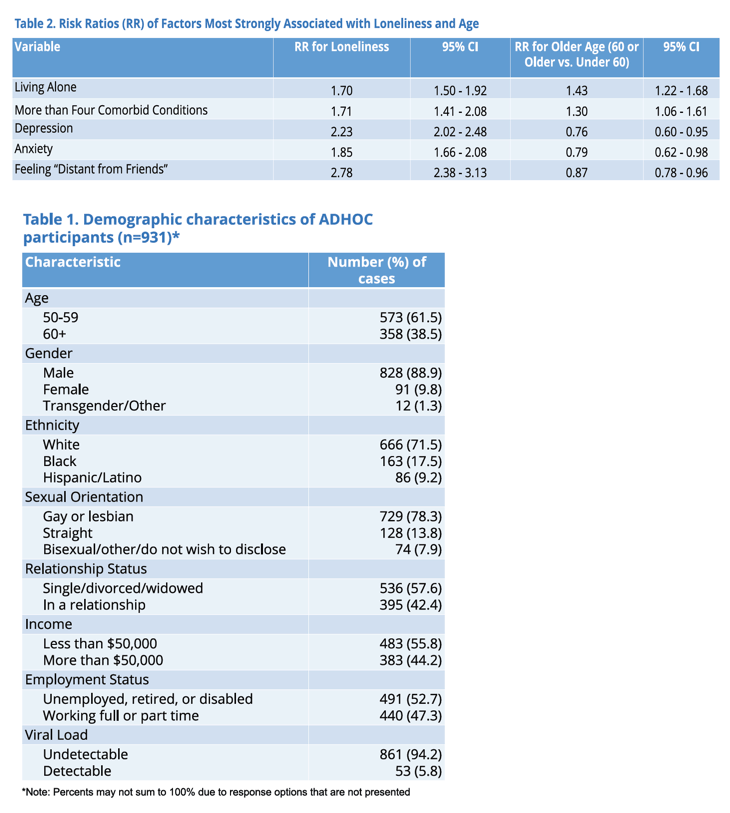
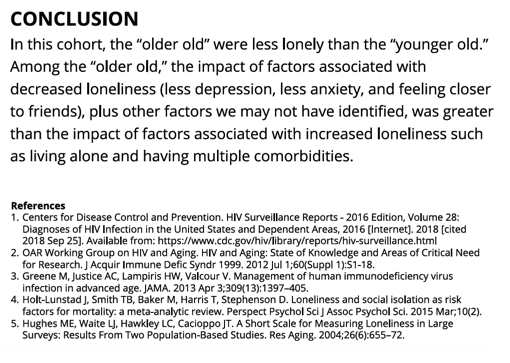
|
| |
|
 |
 |
|
|